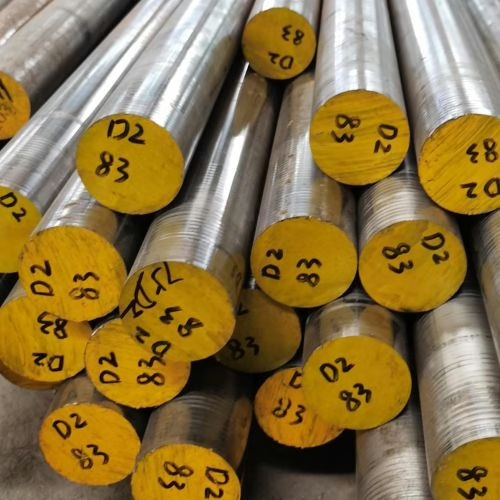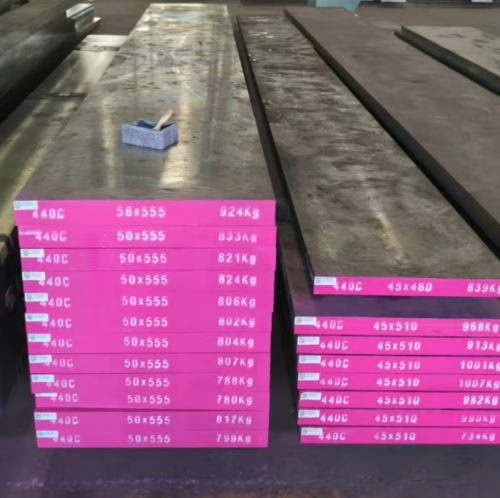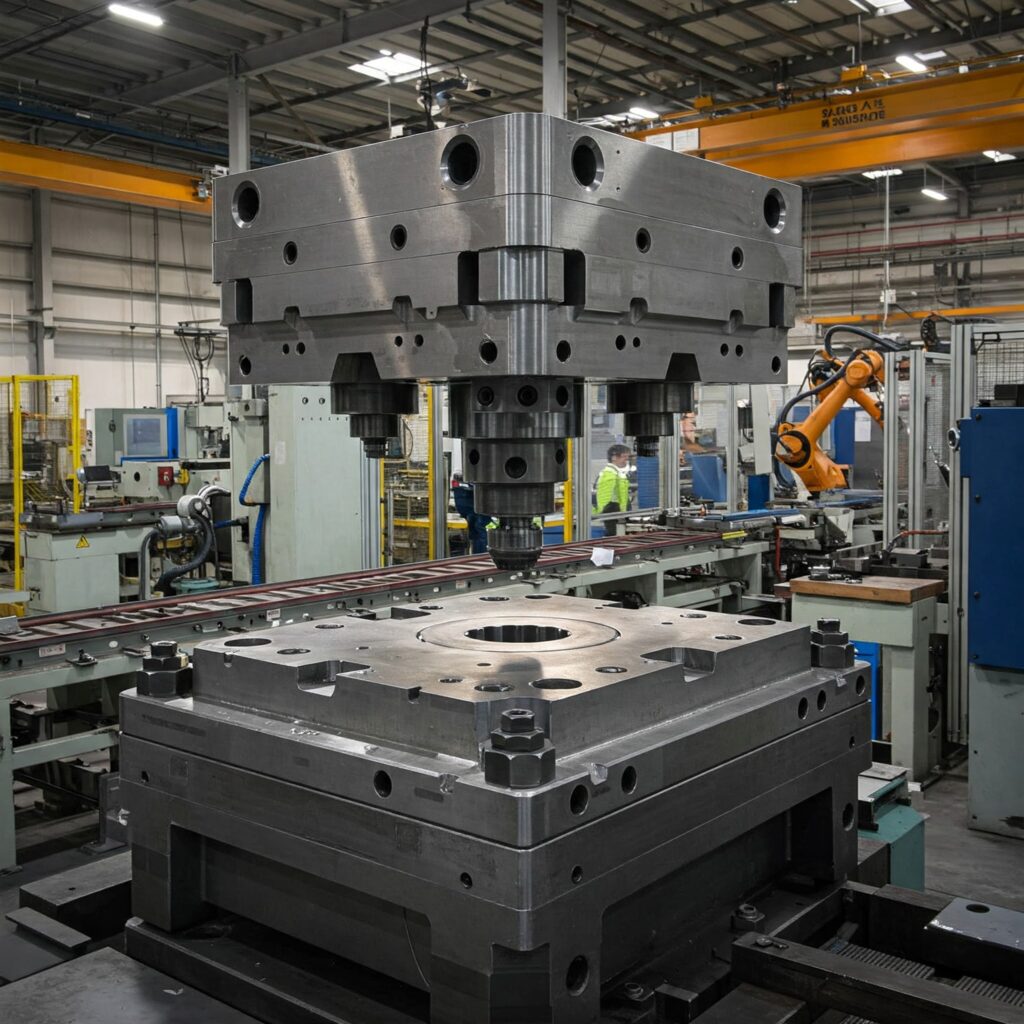Estimated reading time: 7 minutes
Key Takeaways
- D2 steel and 440C steel are both high-carbon materials, but they differ significantly in corrosion resistance, toughness, and applications.
- D2 shows superior wear resistance and versatility in machining, while 440C offers excellent corrosion resistance, especially in moist environments.
- D2 can reach a hardness of 64 HRC, while 440C typically achieves up to 64 HRC with stricter tempering control.
- Both steels have challenges in machinability due to their high hardness but have different strengths based on the application.
- Choosing between D2 steel vs 440C depends on environmental conditions: use D2 for dry settings and 440C for corrosive environments.
Table of contents


D2 tool steel (1.2379) and 440C stainless steel are often regarded as highly esteemed yet controversial representatives within the industry. D2’s exceptional wear resistance and high hardness in cold work applications set the benchmark, while 440C remains a common choice for corrosion-resistant cutlery and bearings. This article aims to provide a detailed and objective comparison of these two materials, offering readers the insights needed to make informed decisions. Although both D2 and 440C are high-carbon steels, they exhibit significant differences in corrosion resistance, toughness, and edge retention.
Composition Overview
D2 tool steel:
| Carbon (C) | Chromium (Cr) | Molybdenum (Mo) | Vanadium (V) | Manganese (Mn) | Silicon (Si) | Phosphorus (P) | Sulfur (S) |
| 1.40 – 1.60% | 11.00 – 13.00% | 0.70 – 1.20% | 0.50 – 1.10% | 0.10 – 0.60% | 0.10 – 0.60% | ≤ 0.030% | ≤ 0.030% |
440C steel:
| Carbon (C) | Chromium (Cr) | Manganese (Mn) | Silicon (Si) | Molybdenum (Mo) | Phosphorus (P) | Sulfur (S) |
| 0.95 – 1.20% | 16.0 – 18.0% | 1.00% max | 1.00% max | 0.75% max | 0.040% max | 0.030% max |
D2 steel Vs. 440C: Hardness and Wear Resistance
When selecting tool steel and specialty steel grades, hardness and wear resistance are often the two most critical factors for customers. Although both D2 (1.2379) and 440C can achieve extremely high hardness after heat treatment, the mechanisms behind this performance differ, leading to distinct behaviors in practical applications.
Both materials derive their hardness from the precipitation of high-hardness carbide particles within a hardened martensitic matrix.
D2 mold steel (1.2379) achieves a maximum hardness of 64 HRC after quenching. It is typically recommended for use within the 58-64 HRC range, depending on tempering temperature and process. 440C stainless steel is the hardest grade within the 440 series. It can achieve Rockwell C-60 after heat treatment. For applications like bearings, its hardness is typically controlled between 61-64 HRC. Note, however, that to achieve maximum hardness, 440C often requires low-temperature tempering at around 150°C, which demands exact temperature control during heat treatment.
When comparing hardness values alone, the two are evenly matched; however, when it comes to maintaining high hardness while enabling deep machining and impact resistance, D2 offers greater versatility in processing methods.
In many stamping and forming applications, D2 offers a significantly longer service life than 440C due to the type and volume of carbides in its microstructure. Wear resistance depends not only on the matrix hardness but also on the quantity and quality of hard particles in the steel.
D2 contains a high proportion of extremely hard chromium-rich M7C3 carbides, while the vanadium in its composition forms exceptionally hard VC carbides, further enhancing the material’s resistance to abrasive wear.
The wear resistance of 440C primarily relies on M23C6 and M7C3 carbides, which are mainly composed of chromium and iron. While its wear resistance is sufficient for valve components and bearing assemblies, it still falls slightly short of D2 when subjected to high-intensity industrial wear.
D2 steel Vs. 440C: Toughness and Machinability
We face an inescapable physical law: the higher the hardness, the lower the toughness and machinability tend to be. D2 (1.2379) and 440C are both typical high-carbon, high-alloy steels, each possessing high hardness. For tool and die makers and machining shops, understanding their shortcomings in toughness and machinability is crucial to reducing scrap.
Although D2 is a high-carbon steel with low ductility, exhibiting direct fracture without significant necking during tensile testing, its overall toughness performance is rated as moderately favorable. 440C stainless steel demonstrates comparatively inferior toughness, possessing extremely low ductility, with elongation potentially dropping to as low as 2% after heat treatment. 440C is absolutely unsuitable for high-pressure containers like gas cylinders that require high impact resistance. It is better suited for precision components subjected to static loads, harsh environments, and stringent rust prevention requirements.
Both contain large amounts of hard alloy carbides that enhance wear resistance but also severely wear down your cutting tools, making machining quite difficult. If the machinability of 1% carbon tool steel is set as the baseline at 100 points, D2 scores only 45 points. As a martensitic stainless steel, 440C is equally difficult to machine. Commercially available 440C must be in a fully annealed “softened” state to enable forming operations.
D2 steel Vs. 440C: Corrosion Resistance
In the comparison between D2 mold steel and 440C, hardness and wear resistance may be neck-and-neck, but corrosion resistance is the watershed that entirely separates the two.
440C stands as the benchmark among traditional high-carbon martensitic stainless steels. It perfectly combines high hardness with outstanding rust resistance and pitting corrosion resistance. If you require a cutting edge to stay sharp or bearings to operate reliably in humid or corrosive environments, 440C is the unparalleled choice. To achieve high hardness, 440C requires a high carbon content. During heat treatment, chromium combines with carbon to form large chromium-rich carbides. However, as chromium is consumed by carbon to form these hard carbides, the effective chromium content remaining in the steel matrix—which is essential for forming the rust-resistant passivation film—is reduced. This is known as the “chromium depletion” phenomenon. During heat treatment, tempering temperatures must be strictly controlled to ensure the corrosion resistance of 440C steel does not deteriorate. We recommend tempering either below 400°C (750°F) or above 600°C (1100°F), avoiding the intermediate critical zone.
D2 contains as much as 11.5%–12.05% chromium, so why isn’t it considered stainless steel? The primary purpose of chromium in D2 is not rust prevention, but to enhance hardenability and wear resistance. Due to D2’s extremely high carbon content, the vast majority of chromium forms carbides. Consequently, there is almost no free chromium in the matrix to resist corrosion. Therefore, D2 is unsuitable for prolonged exposure to high temperatures or corrosive environments.
D2 Vs. 440C Comparison Table
| Feature | D2 Tool Steel | 440C Stainless Steel |
| Type of Steel | High-carbon, High-chromium cold-work tool steel | High-carbon, High-chromium martensitic stainless steel |
| Key Alloying Elements | Carbon (~1.5%), Chromium (~12%), Molybdenum (~0.8%), Vanadium (~0.9%) | Carbon (~1.0%), Chromium (~17%), Molybdenum (~0.5%) |
| Typical Hardness (HRC) | 58-62 HRC (can reach 64 HRC as-quenched) | 59-60 HRC (can reach up to 64 HRC) |
| Wear Resistance | Extremely high; a benchmark for abrasion resistance | Good abrasion resistance; suitable for wear-resistant applications |
| Toughness | Low to moderate | Low; poor toughness due to high carbon content and hardness |
| Corrosion Resistance | Moderate (for a tool steel); generally inferior to true stainless steels due to carbide precipitation | Good (for a martensitic stainless steel); widely used where corrosion resistance is a primary concern. However, martensitic grades generally have the lowest corrosion resistance among stainless steels. |
| Machinability | Poor; difficult to machine and grind due to high alloy content | Moderate; generally better than D2 |
Applications and Summary
The unique balance of properties dictates the typical use cases for each steel:
| Cutting tools (knives, surgical instruments), ball bearings, bearing races, and valve parts requiring high wear resistance, combined with corrosion resistance | Primary Properties | Typical Applications |
| D2 Tool Steel | Extreme wear resistance, air-hardening, high dimensional stability, moderate toughness | Cutting tools (knives, surgical instruments), ball bearings, bearing races, and valve parts require high wear resistance, combined with corrosion resistance. |
| 440C Stainless Steel | Highest attainable hardness among conventional stainless steels, good abrasion resistance, superior corrosion resistance (for martensitic grade), very low ductility | Cutting tools (knives, surgical instruments), ball bearings, bearing races, and valve parts require high wear resistance and corrosion resistance. |
Choosing between D2 (1.2379) tool steel and 440C stainless steel is fundamentally not about which is stronger, but which is more suited to the environment.
If your application is in a dry industrial workshop environment, and the goal is wear resistance, dimensional stability, and long service life, D2 is the undisputed best choice.
If your tool must survive in humid, corrosive, or biological environments, D2 will fail due to rust, no matter how hard it is. In this case, 440C is the only option. While maintaining high hardness, 440C offers superior corrosion resistance and rust prevention.


